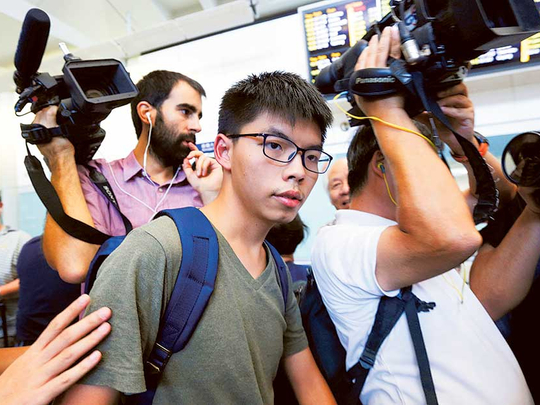
Hong Kong/Bangkok: Thailand on Wednesday barred entry to a Hong Kong student activist who helped organise pro-democracy protests in the Chinese-ruled city in 2014, with a Thai newspaper saying he had been deported and “blacklisted” at China’s request.
Bespectacled Joshua Wong, 19, was detained in Bangkok where he had been invited to speak at universities about Hong Kong’s “Umbrella Movement” street protests and on setting up his political party, Demosisto.
He was later put on a plane back to Hong Kong where he told reporters Thai authorities had not given him a reason for refusing him entry but had shown him a document citing a security law. One officer had mentioned a “blacklist”, he said.
“As a Hong Kong person, I did not expect that even if I do not enter mainland China, I would be inside a foreign detention centre, detained by other police. This is unbelievable,” he said.
The protests that Wong helped lead in Hong Kong, a former British colony which returned to Chinese rule in 1997, presented Communist Party rulers in Beijing with one of their biggest political headaches in decades.
Wong was given 80 hours of community service by a Hong Kong court in August on a charge of unlawful assembly for taking part in a sit-in at the height of the protests in the Asian financial hub.
Thailand has been ruled by a junta since a 2014 coup which was widely condemned by the West. Since then, the generals running Thailand have forged closer ties with China.
Thailand’s Nation newspaper quoted a deputy commander of airport immigration police, Colonel Pruthipong Prayoonsiri, as saying China had sent a request “to seek cooperation to deny” Wong entry.
“As a result, the Immigration Bureau blacklisted him and held him for deportation,” Pruthipong was quoted as saying.
But Pruthipong later said he had not spoken to the newspaper, did not know if Wong had been blacklisted and declined further comment.
The Thai Foreign Ministry said in a statement permission for Wong to enter Thailand “involves various factors”.
Thai Prime Minister Prayuth Chan-ocha said Wong’s expulsion was a matter for China, not Thailand.
“Why he was sent back is China’s issue,” Prayuth said.
China’s Foreign Ministry, when asked about Wong’s detention, said it had “noticed the relevant reports”.
“China respects Thailand’s exercise of immigration control according to the law,” it said in an email.
‘Lucky’
Wong flew in to Bangkok just before midnight on Tuesday and arrived back in Hong Kong on Wednesday afternoon.
Suspicion of China’s involvement in his expulsion would add to concern in Hong Kong that mainland authorities are clamping down on dissent despite a “one country, two systems” formula, meant to preserve the city’s freedoms.
Wong referred to the case of five Hong Kong booksellers, specialising in works critical of Chinese leaders, who disappeared only to emerge in custody in mainland China. One of them disappeared while in Thailand and is the only one still in detention.
“I’m lucky I did not become the next person to disappear,” Wong said.
Wong was denied entry by Malaysia in May 2015 when he was due to give talks on democracy in China.
Wong was invited by the politics faculty at Bangkok’s Chulalongkorn University to speak on the 40th anniversary of a bloody crackdown by the Thai army on student protests.
Human Rights Watch condemned Wong’s detention.
“Thailand’s arrest of Joshua Wong ... sadly suggests that Bangkok is willing to do Beijing’s bidding,” its China director, Sophie Richardson, said in an email.
A spokesman for the UN Human Rights Office in Asia said the prevention of Wong from attending the university talks “raises further concerns about restrictions on peaceful freedom of expression and assembly in Thailand”.
Since Thailand’s 2014 coup, the military has clamped down on dissent and banned political protests. The Thursday anniversary of the 1976 crackdown on Bangkok student protests has stirred sensitive memories.












